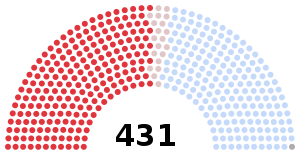
Back لایحه مراقبت سلامت آمریکای ۲۰۱۷ Persian American Health Care Act of 2017 SIMPLE Đạo luật Chăm sóc sức khoẻ Mỹ năm 2017 Vietnamese 2017年美国卫生保健法 Chinese

| This article is part of a series on |
| Healthcare reform in the United States |
|---|
|
|
The American Health Care Act of 2017 (often shortened to the AHCA or nicknamed Ryancare) was a bill in the 115th United States Congress. The bill, which was passed by the United States House of Representatives but not by the United States Senate, would have partially repealed the Affordable Care Act (ACA).
Republican Party leaders had campaigned on the repeal of the ACA since its passage in 2010, and the 2016 elections gave Republicans unified control of Congress and the presidency for the first time since the ACA came into effect. Upon the start of the 115th Congress, Congressional Republicans sought to pass a partial repeal of the ACA using the reconciliation process, which allows legislation to bypass the Senate filibuster and pass with a simple majority in the Senate. With the support of President Donald Trump, House Republicans introduced the AHCA in early 2017, and the bill passed the House in a close vote on May 4, 2017. All House Democrats, along with several members of the centrist Tuesday Group and some other House Republicans, voted against the AHCA. The bill would have repealed the individual mandate and the employer mandate, dramatically cut Medicaid spending and eligibility, eliminated tax credits for healthcare costs, abolished some taxes on high earners, and altered rules concerning pre-existing conditions and essential health benefits.
Senate Republicans initially sought to pass the Better Care Reconciliation Act of 2017 (BCRA), a healthcare bill containing provisions largely similar to those of the AHCA. The BCRA was never voted on in its original form due to opposition from several Republican senators. Senate Majority Leader Mitch McConnell instead sought to pass the Health Care Freedom Act (HCFA), which was colloquially referred to as a "skinny repeal" by Republicans since it would only repeal the individual mandate and the employer mandate. On July 27, the Senate rejected the HCFA in a 51-to-49 vote, with Republican senators Susan Collins, Lisa Murkowski, and John McCain joining with all Senate Democrats in voting against it. In September 2017, some Republican senators pushed a renewed effort to repeal the ACA, but their bill never received a vote in the Senate. The 115th Congress ultimately did not pass an ACA repeal bill, though it did pass the Tax Cuts and Jobs Act of 2017, which repealed the individual mandate. The AHCA was a significant issue in the midterm elections the following year, which saw the election of a Democratic House majority and defeat of several of the bill's supporters for re-election. Members of Congress who voted for the AHCA were more likely to lose their re-election bids.[1]
The nonpartisan Congressional Budget Office projected that the AHCA would have increased the number of uninsured people by 23 million over 10 years, but would have decreased the federal budget deficit by $119 billion over the same period.[2] Polling consistently showed that the AHCA was deeply unpopular with the American population during and after its evaluations in Congress. Business Insider stated that the AHCA was "the least popular major bill in decades", and major medical organizations, including the American Medical Association and the American Academy of Pediatrics, strongly condemned the bill and excoriated its supporters in Congress.[3][4][5]
- ^ Bussing, Austin; Patton, Will; Roberts, Jason M.; Treul, Sarah A. (May 8, 2020). "The Electoral Consequences of Roll Call Voting: Health Care and the 2018 Election". Political Behavior. 44: 157–177. doi:10.1007/s11109-020-09615-4. ISSN 1573-6687. S2CID 218963597. Archived from the original on December 6, 2020. Retrieved October 24, 2020.
- ^ "Congressional Budget Office Cost Estimate H.R. 1628" (PDF). Congressional Budget Office.
- ^ Bryan, Bob (May 8, 2017). "The Republican healthcare bill is the least popular major bill in decades". Business Insider. Archived from the original on December 9, 2018. Retrieved December 9, 2018.
- ^ Marcus, Mary Brophy (May 5, 2017). "Prestigious medical groups denounce health care vote". CBS News. Archived from the original on December 9, 2018. Retrieved December 9, 2018.
- ^ Morris, Chris (July 7, 2017). "Study: GOP Healthcare Plan Least Popular Bill in Three Decades". CBS News. Archived from the original on December 9, 2018. Retrieved December 9, 2018.
© MMXXIII Rich X Search. We shall prevail. All rights reserved. Rich X Search
